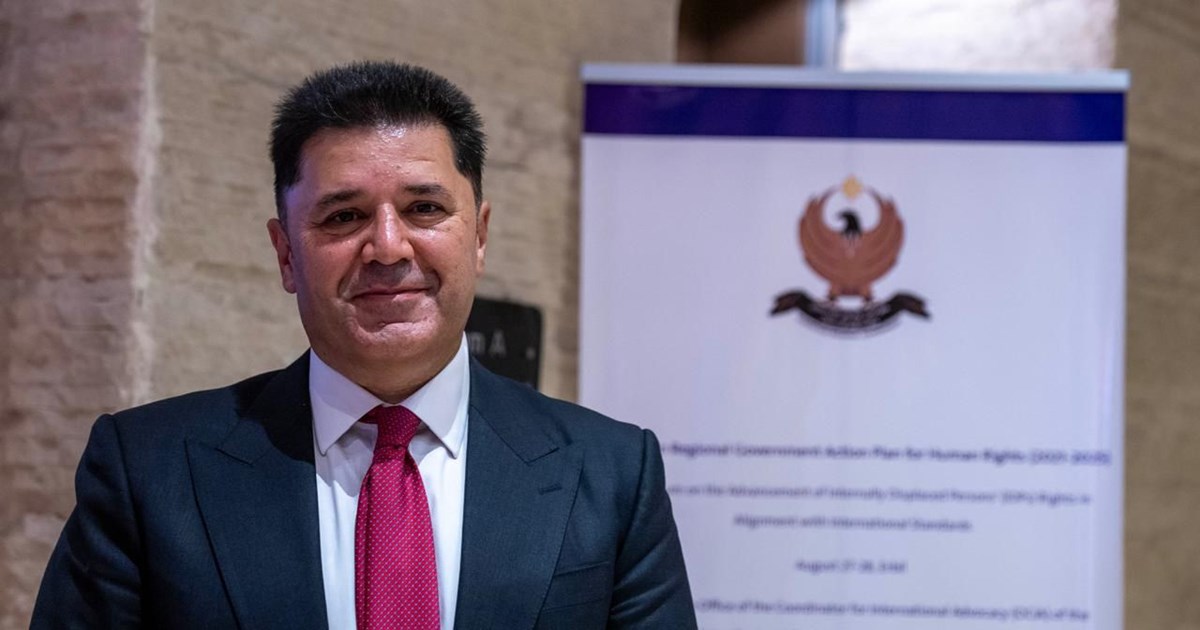Coordinator of International Advocacy Argues KRG Succeeded in Meeting International Directives on IDPs and Refugees

On Tuesday, 27 August 2024, the Office of the Coordinator for International Advocacy (CIA), in collaboration with the International Organisation for Migration (IOM), organised a conference titled ‘Promoting the Rights of Internally Displaced Persons in Accordance with International Standards’.
The Kurdistan Region’s Coordinator for International Advocacy, Dinadr Zebari, highlighted that the introduction by the KRG of the ‘Regional Human Rights Action Plan for 2021 – 2025’ aims to align laws and policies legislated in the Region with national and international human rights standards, elevating the Kurdistan Region’s position internationally in advancing commitments to human rights.
Zebari noted that the KRG has implemented many of the international human rights recommendations in relation to refugees and IDPs including reception, accommodation, and the provision of essential services. Accordingly, the refugees and IDPs are provided with awareness on their rights, together with procedures to obtain more assistance. He called for greater cooperation between the KRG’s institutions, civil society organisations, and national and international bodies to provide better protection, empowerment, and the reintegration of IDPs.
With regards to the closure of refugee camps in the Kurdistan Region, Zebari argued the KRG stresses that such closures depend on certain conditions being met on the ground (as the conditions are still insecure), as well as the lack of compensation and transitional justice to ensure a safe and sustainable return of IDPs.
Zebari stated that in collaboration with the IOM, the KRG has developed a draft law for ‘National Strategy for Migration in Iraq and the Kurdistan Region’. A joint committee with the United Nations High Commissioner for Refugees (UNHCR) has also been formed to develop comprehensive guidelines for dealing with IDPs and refugees. These two steps are essential in addressing some of the challenges of dealing with the issue. The Ministry of Interior has established police departments for IDPs and Refugees’ Affairs in various town and cities to better handle their concerns and provide them with the necessary protection in collaboration with the local security institutions and governmental and non-governmental organisations.
The Coordinator for International Advocacy noted that the Kurdistan Region is currently home to 862,346 IDPs, distributed across 22 camps: 15 in Duhok, 6 in Erbil, and 1 in Slemani. A significant portion of these IDPs have been integrated into host communities.
He also added that the KRG is responsible for 80% of the services provided to refugees, through the allocation of 138 schools for refugees and an additional 54 mainstream schools throughout the Region that also take refugees. There are currently 40,410 refugee students receiving formal education. As of 2021, the Ministry of Education has decided to allow refugee students to enrol in mainstream schools across the Region. Since the 2021 - 2022 academic year, the KRG has facilitated the admission of 1,160 refugee students and those from the Kurdistani Areas Outside the Region, including Kirkuk, into universities in the Region.
Zebari hoped that the conference would be an important step towards implementing human rights principles and improving collaboration between the KRG and federal government. He also stressed the importance of active participation of all relevant stakeholders in improving the services delivered to refugees and the provision of compensation.


